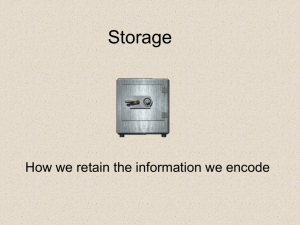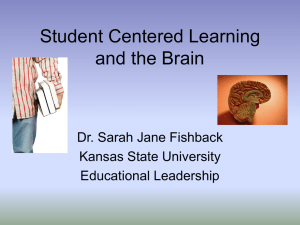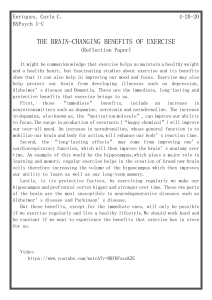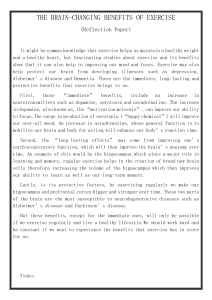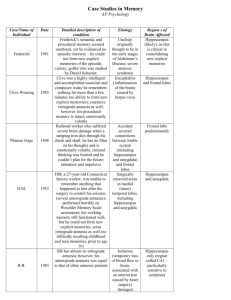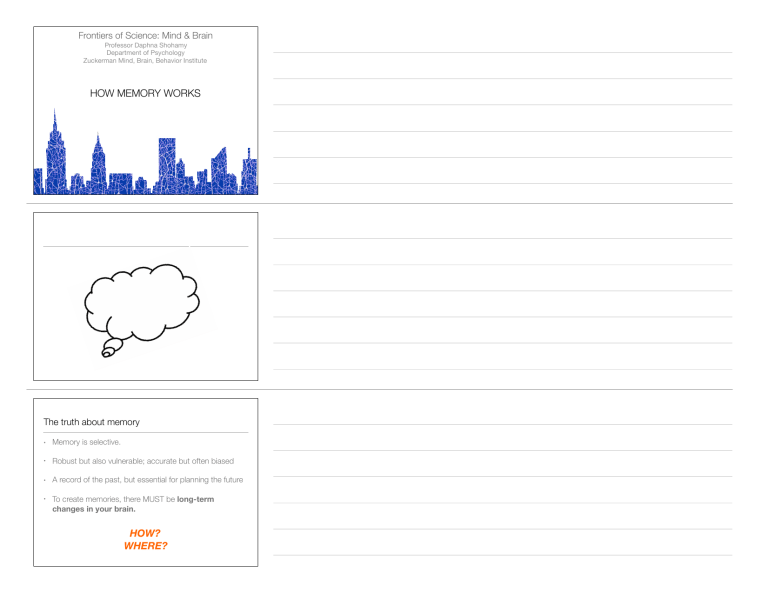
Frontiers of Science: Mind & Brain Professor Daphna Shohamy Department of Psychology Zuckerman Mind, Brain, Behavior Institute HOW MEMORY WORKS The truth about memory • Memory is selective. • Robust but also vulnerable; accurate but often biased • A record of the past, but essential for planning the future • To create memories, there MUST be long-term changes in your brain. HOW? WHERE? Frontiers of Memory Research Localization Hippocampus Plasticity Space & Time Is memory distributed or localized? Tried to localize the engram - the single location of a memory. He failed to find it. And concluded that memories are distributed throughout the brain. Karl Lashley 1890-1958 Early evidence for localized memory Brenda Milner Sue Corkin 1918 - 1937 - 2016 A serendipitous discovery that changed everything we know about memory and the brain Patient H.M. Surgery to treat intractable epilepsy, at age 27. The seizures were localized to the medial temporal lobe, centered on the hippocampus. Henry Molaison 1926 - 2008 Patient H.M. Surgical removal of the MTL Outcome of surgery 1. Treated seizures 2. Healthy recovery in general 3. But…no new memories Patient H.M. No memories of new people, places, moments Anterograde amnesia EPISODIC (or declarative) memory Other kinds of learning were fine Selective memory impairment Patient H.M. Two fundamental insights 1. Different parts of the brain support different kinds of memory Different kinds of Memory A Taxonomy of Memory *remember Lashley? Measuring different forms of learning Learning from feedback CORRECT 70% Memory for feedback 30% Different kinds of Memory Learning from feedback 65 50 80 % correct Damage to the hippocampus % correct 80 65 50 Control Amnesics 80 % correct % correct 80 Damage to the basal ganglia 65 50 Control Amnesics Memory for feedback 65 50 Control Parkinson’s Control Parkinson’s Different kinds of Memory Learning from feedback 65 50 80 % correct Damage to the hippocampus % correct 80 50 % correct % correct 80 65 50 65 Control Amnesics DOUBLE DISSOCIATION Control Amnesics 80 Damage to the basal ganglia Memory for feedback Control Parkinson’s 65 50 Control Parkinson’s Patient H.M. Two fundamental insights 1. Different parts of the brain support different kinds of memory 2. A specific and critical role for the hippocampus and medial temporal lobe in episodic memory Questions? Frontiers of Memory Research Localization Hippocampus Plasticity Space & Time The hippocampus *Implicated in Alzheimer’s, anxiety and stress A slice of cortex visualized with “brainbow” A slice of the hippocampus visualized with “brainbow” The hippocampus Neural circuits for memory Creating memories in the healthy human brain • Henry was a single historical case study. What can modern neuroscience teach us about the hippocampus and memory? What happens in the brain when new memories are formed? Creating memories in the healthy human brain Creating memories in the healthy human brain In healthy people, the hippocampus is more active for experiences that are later remembered. Converging evidence for the role of the hippocampus in memory. The Hippocampus How do neurons in the hippocampus create memories? Long-term changes in neurons • How does the hippocampus build memories? What does a memory look like in a neuron? Aplysia Eric Kandel Nobel prize 2000 Simple forms of memory. Simple neural circuit. Long-term changes in neurons Activating a synapse can make it stronger minutes, hours and even days later. Long term potentiation (LTP) Changes to dendrites LTP Neural plasticity Plasticity is a key concept in learning, memory and in brain function, in general What we have learned so far… • The hippocampus (and nearby structures) are necessary for building long-term episodic memories, but not for other kinds of memories (e.g. habits, working memory). • The process of creating memories involves long-term changes to synapses - strengthening of the connections between neurons. But, it turns out to be a little more complicated (& interesting) 1. The hippocampus and navigation 2. The hippocampus and future-thinking Frontiers of Memory Research Localization Hippocampus Plasticity Space & Time The hippocampus and navigation Place Cells Neurons in the hippocampus represent a spatial map The hippocampus and navigation O’Keefe, Moser, Moser Nobel prize, 2014 Place Cells Neurons in the hippocampus represent a spatial map The hippocampus and navigation Let’s listen* to some place cells in action *Why listen? Remember that neurons communicate with electrical activity. We can record and amplify that activity to “listen” to neurons firing. The hippocampus and navigation https://www.youtube.com/watch?v=bL0WLyMLwqw The hippocampus and navigation In humans too? Place Cells in humans* Virtual Reality Navigation * Q: How can we record electrical activity from specific neurons in the human brain? (would you volunteer your brain?) A: Only from patients who are already undergoing brain surgery. “What does this have to do with memory?” The hippocampus and future-thinking Converging “Imagine youevidence are lying onfor a white the role tropical of the beach in a beautiful tropical hippocampus in imagining thebay” future. Prefrontal cortex Hippocampus Patients with amnesia have trouble imagining future events People use the hippocampus to remember and to imagine But, not just the hippocampus! (also areas in the cortex) Is memory distributed or localized? Karl Lashley Brenda Milner Sue Corkin 1890-1958 1918 - 1937 - 2016 Distributed AND localized. The right question, the wrong tools. Questions? Connecting the dots Memory Navigation Imagination Hippocampus Binding elements of experiences in time and space Experiment demo Memory is biased. It is shaped by motivation, interests and goals. Sometimes even AFTER an experience. A record of the past that is used to guide behavior in the future. Connecting the dots Memory Navigation Imagination Hippocampus Binding elements of experiences in time and space A tight link between what we remember from the past and what we decide to do in the future Next week How we make decisions (* including research on patients with Anorexia Nervosa) thank you!
